Professional Courses
Industry-relevant training in Business, Technology, and Design
Categories
Interactive Games
Fun games to boost memory, math, typing, and English skills
Typing
Memory
Math
English Adventures
Knowledge
What are the Most Important Topics for the JEE Main Exam

If you want to score well in JEE Main, it helps to focus on the most important topics. These areas appear often in tests and carry a large weightage. This guide looks at key topics in Physics, Chemistry, and Mathematics. It also shares tips, practice ideas, and useful AllRounder.ai links.
With a clear subject-wise strategy, your preparation will be smart and effective.
Why Focus on Important Topics
Every year, most JEE Main questions come from common chapters. They cover core ideas and test your understanding.
By focusing on these key areas, you save time and build stronger confidence. You cover the highest-value sections first and master them before moving to tougher areas.
Keep in mind that weaker topics still matter. But stronger sections help you score more first. Then you can fill the gaps later.
Physics: Key Topics to Master
Physics is logical. Once you understand the rules, solving problems becomes easier.
Perfect for JEE Main: Mechanics
Mechanics is a heavy scorer. Chapters like:
- Kinematics
- Laws of Motion
- Work, Energy, Power
- Circular Motion
- Rotational Dynamics
These make up over 15 to 20 percent of the Physics paper. Focus on concepts first. Then solve problems from HC Verma or AllRounder.ai’s Mechanics quizzes.
Electrostatics and Current Electricity
This section tests your understanding of electric charges and circuits. Topics to focus on:
- Coulomb’s Law
- Electric Field and Potential
- Capacitance
- Ohm’s Law
- Kirchhoff’s Rules
Practice both theory and numericals. Use simulations or concept videos on AllRounder.ai to build clarity.
Magnetism and Electromagnetism
Magnetic effects feature in many questions. Focus on:
- Magnetic Field
- Force on Moving Charges
- Biot–Savart Law
- Ampere’s Circuital Law
- Electromagnetic Induction
Use all problem types. Aim for mixed practice on AllRounder.ai or standard books.
Waves, Oscillations, and Optics
These sections test your knowledge of light and motion:
- Simple Harmonic Motion
- Wave Equations
- Snell’s Law
- Interference and Diffraction
Practise drawing ray diagrams. Work on numerical wave problems each day. Use AllRounder.ai’s short quizzes on Wave optics.
Thermodynamics and Heat
Although less frequent, these topics are important:
- First and Second Laws of Thermodynamics
- Heat Engines
- Entropy
- Calorimetry
Understand formulas deeply. Mixed revision helps retention.
Modern Physics
Covers key modern developments:
- Photoelectric Effect
- Bohr Model
- Radioactivity
- Nuclear Physics
Many direct questions come from here. Read theory from NCERT and solve MCQs.
Chemistry: Most Important Topics by Subsection
Chemistry is often seen as easier to score once you build the right habits. Let’s look at the most important areas.
Physical Chemistry Topics
These chapters include calculation-based questions:
Mole Concept and Stoichiometry
Focus on gas laws, molar volumes, equivalents. They are core to calculations.
Chemical Thermodynamics
Practice spontaneity, energy change, Gibbs free energy problems.
Chemical Equilibrium and Ionic Equilibrium
Equilibrium constants, pH and buffer systems, solubility product numericals.
Electrochemistry
Understand cell potentials, Nernst equation, and electrode processes.
Chemical Kinetics
Practice rate laws and order of reaction problems.
Use AllRounder.ai Physical Chemistry quizzes to test your skills.
Inorganic Chemistry Topics
Inorganic topics rely heavily on memory and understanding.
Periodic Table and Properties
Group trends, atomic radii, ionisation energy, electronegativity.
Chemical Bonding and Molecular Structure
VSEPR, hybridisation, crystal field theory.
Coordination Compounds
Use Lewis structures and binding geometries.
p—block and d—block Elements
Know common reactions and properties.
Qualitative Analysis
Practice salt analysis and salt identification techniques.
NCERT is the main source for Inorganic Chemistry. Use it well.
Organic Chemistry Topics
This section tests your ability to understand reaction mechanisms and structures.
General Organic Chemistry
Carbocation stability, inductive effect, resonance, isomerism.
Hydrocarbons
Alkenes, alkynes, benzene rings, their reactions like aldol condensation and nitration.
Alcohols, Ethers, Aldehydes, Ketones
For example Grignard reagents, oxidation processes, identification tests.
Carboxylic Acids and Their Derivatives
Practice reactions like esterification and amide formation.
Biomolecules and Polymers
Understand amino acids, peptides, DNA, proteins and common polymers.
Organic Reaction Mechanisms
Practice mechanism problems to score well.
Use AllRounder.ai Organic Chemistry practice sets for quick revision.
Mathematics: Priority Topics to Score
Mathematics requires steady practice and concept clarity. Here are the key areas.
Algebra
Important sections here:
Quadratic Equations and Complex Numbers
Root relationships, solving quadratic forms, modulus and arguments.
Sequence and Series
Arithmetic progressions, geometric series, binomial theorem.
Permutations and Combinations
Basic counting methods and arrangements.
Sets, Relations and Functions
Domain, range, inversion, composite functions, equivalence relations.
Matrices and Determinants
Solving equations with Cramer’s Rule and transformations.
These topics come up frequently every year. Solve them well to build confidence.
Calculus
This is the most scoring Maths area.
Limits, Continuity, Differentiability
Includes understanding function behaviour and derivatives.
Applications of Derivatives
Tangents, normals, maxima, and minima.
Indefinite and Definite Integrals
Focus on integration by parts, transforming limits, area under curves.
Differential Equations
Practice solving linear differential equations and applications.
Sequence and Series in Calculus
Convergence and divergence of infinite series.
Daily practice of 5–10 questions here is recommended.
Coordinate Geometry
High-priority area with regular questions.
Straight Line
Slope, equation, distance, angle between lines.
Circle
Tangent form, chords, parametric form.
Conic Sections
Parabola, ellipse, hyperbola equations and properties.
This chapter has a balanced mix of algebra and geometry. Work on both coordinate and graphical problems.
Vectors and 3D Geometry
Key areas here:
- Vector operations and magnitude
- Scalar and vector products
- 3D line and plane equations
Each concept requires a clear understanding and multiple practice problems.
Trigonometry
Tougher, but still scoring.
- Identities and equations
- Inverse trigonometric functions
- Solutions of triangles
Use cheat sheets or flashcards for identities and practice trigonometric equations via quizzes on AllRounder.ai.
How to Build a Daily Study Strategy
A strong strategy balances all subjects over time and key focus in individual ones .
Example Weekly Schedule
Use this as a template and adjust based on your pace.
-
Monday
• Mechanics
• Mole Concept
• Algebra -
Tuesday
• Optics
• Chemical Equilibrium
• Calculus -
Wednesday
• Electrostatics
• Organic Chemistry
• 3D Geometry -
Thursday
• Magnetism
• Thermodynamics
• Coordinate Geometry -
Friday
• Modern Physics
• Inorganic Chemistry
• Vectors -
Saturday
• Revision
• Full Mock Test -
Sunday
• Review Errors
• Light Practice
Use Spaced Revision
Never study one topic and forget it. Revisit important chapters twice a week. Use flashcards. Take mini quizzes. AllRounder.ai offers tools for scheduled revision and reminders.
Mock Tests and Practice Papers
Mock tests are a core part of your preparation.
- Take one full-length mock every weekend.
- Set a timer and simulate exam conditions.
- Review all questions, especially wrong ones.
- Classify errors: conceptual, calculation, silly mistake, or time issue.
AllRounder.ai offers timed mock tests across subjects. You also get analytics to track your weak sections.
Revision Tips in Final Phase
In the last 30 days, focus on these strategies:
- Solve one full mock test every three days.
- Keep all important notes, flashcards, and formulas handy.
- Work only on your weak areas. Avoid starting new topics.
- Revise every error made in mocks.
- Stay calm and maintain good health.
A few minutes of meditation, a 7-hour sleep, and light exercise can boost your performance.
Recommended Books for Important Topics
Here are some go-to books:
Physics
- NCERT Physics
- H. C. Verma Concepts of Physics
- D. C. Pandey Understanding Physics
Chemistry
- NCERT Chemistry
- O. P. Tandon Series
- P. Bahadur Physical Chemistry
Mathematics
- NCERT Mathematics
- R. D. Sharma Comprehensive Mathematics
- Arihant Cengage Mathematics
These are reliable sources for both concept clarity and practice.
Role of AllRounder.ai JEE Resources
AllRounder.ai is a great tool to support your JEE Main prep:
- Topic quizzes for every chapter in Physics Chemistry and Maths
- Timed mock tests simulating real exam conditions
- Error logs and analytics to identify weak points
- Flashcards and formula sheets for revision
- Spaced repetition and revision schedule
- Study planner and goal tracker
Use this platform daily. It helps you stay organized and maximize your effort.
Keep Motivated and Balanced
Preparation can be intense, so keep yourself balanced.
- Celebrate small wins.
- Switch subjects daily to avoid boredom.
- Take days off for rest and fun.
- Talk to peers, teachers, or mentors for guidance.
A calm mind and a healthy lifestyle go a long way during intense study periods.
Final Thoughts
Focusing on the most important topics gives you a powerful edge. These chapters appear often and carry more marks. Study them well. Practice deeply. Revise smartly.
Use trusted books along with platforms like AllRounder.ai. It helps you track progress, revise systematically, and build confidence.
Remember, small daily steps add up to big results. Tackle the high-impact topics first. Keep your mind fresh and your belief strong. With this strategy, scoring well in JEE Main is well within reach.
Keep going and give it your best! You’ve got this.

Learn how negative marking works in JEE Main 2025 and how to avoid it with practical, proven strategies.

Learn how to prepare for JEE Main 2025 with a proven, winning strategy. Get a detailed plan, subject-wise tips, and...

Learn the chapter-wise weightage for JEE Main 2025 across Physics, Chemistry, and Maths. Prioritise smartly and...

Discover the most important chapters for JEE Main 2025 across Physics, Chemistry, and Maths. Focus your prep smartly...

Discover top JEE Main books for Physics, Chemistry & Maths. Learn how NCERT & reference books pair with AllRounder.

Looking for free JEE Main mock tests to boost your preparation? Discover the best platforms, tips, and strategies to...

Discover what scores and percentiles are needed to secure seats in top NITs, IIITs, and GFTIs. Learn how category...
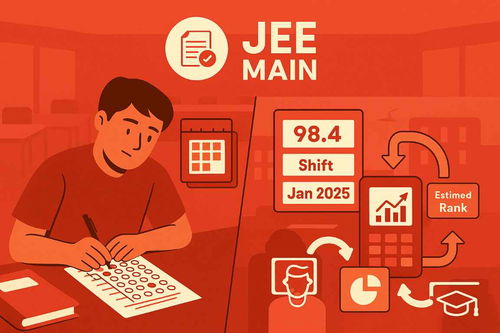
Understand the exact difference between JEE Main percentile and rank. Learn how scores are normalized across...

Understand the JEE Main scoring system to maximize your result. Learn the marking scheme, how to handle negative...

Confused about the JEE Main attempt limit? This guide clarifies how many times you can appear, the eligibility...

Wondering how many times you can appear for JEE Mains? This guide explains the total attempts allowed, session...
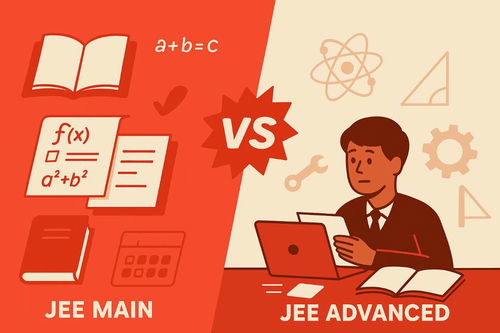
Discover the key differences between JEE Main and JEE Advanced in terms of syllabus, pattern, difficulty, and prep...

Confused about JEE Main qualification rules? This blog gives you a detailed checklist of eligibility criteria,...

Explore this simple, step‑by‑step guide to the JEE Main counselling process. Learn how to register, fill choices,...

Curious about how many times SC students can attempt JEE Main? This complete guide covers JEE Mains attempt rules,...

Want to score 200+ in JEE Main? This practical guide gives you proven tips, subject-wise strategies, mock test...

Wondering how the JEE Main exam is structured? This complete guide breaks down the official JEE Main exam pattern...
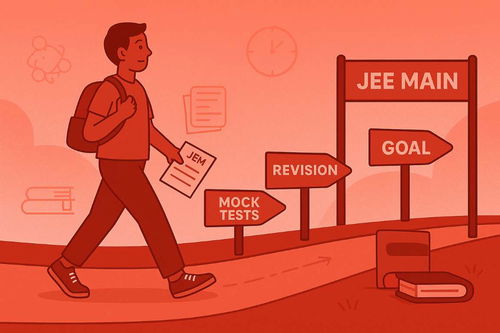
Learn how to crack JEE Main on your first attempt with proven strategies. This guide covers planning, conceptual...
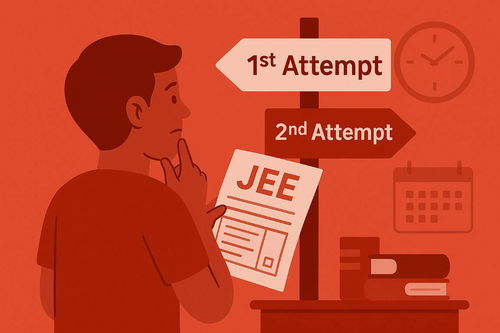
Learn how many JEE Main attempts you can take after Class 12. This guide covers eligibility, attempt limits, subject...

Learn about the JEE Main age limit requirement and key eligibility rules. Understand the attempt policy, Class 12...

Discover the most important topics for the JEE Main exam in Physics, Chemistry, and Mathematics. Learn subject-wise...

Get a subject-wise preparation strategy for JEE Main step-by-step using smart tips and trusted resources from AllRounder.ai.

Looking to score high in JEE Main 2026? Discover expert preparation tips on creating smart study plans, mastering...

Confused about JEE Mains eligibility? This detailed guide explains JEE Mains eligibility criteria including...
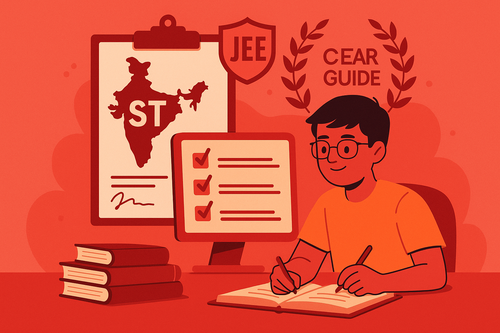
Confused about JEE Main Attempts for ST Category? This detailed guide covers attempt limits, age relaxations,...

Wondering how many times OBC candidates can appear for JEE Mains? This detailed guide explains JEE Main Attempts for...

Dropping a year for JEE Mains? This in-depth strategy guide helps droppers optimise their JEE Main attempts with...

Confused about how many times you can appear for JEE Main? This guide explains the number of JEE attempts, session...
Resources
-
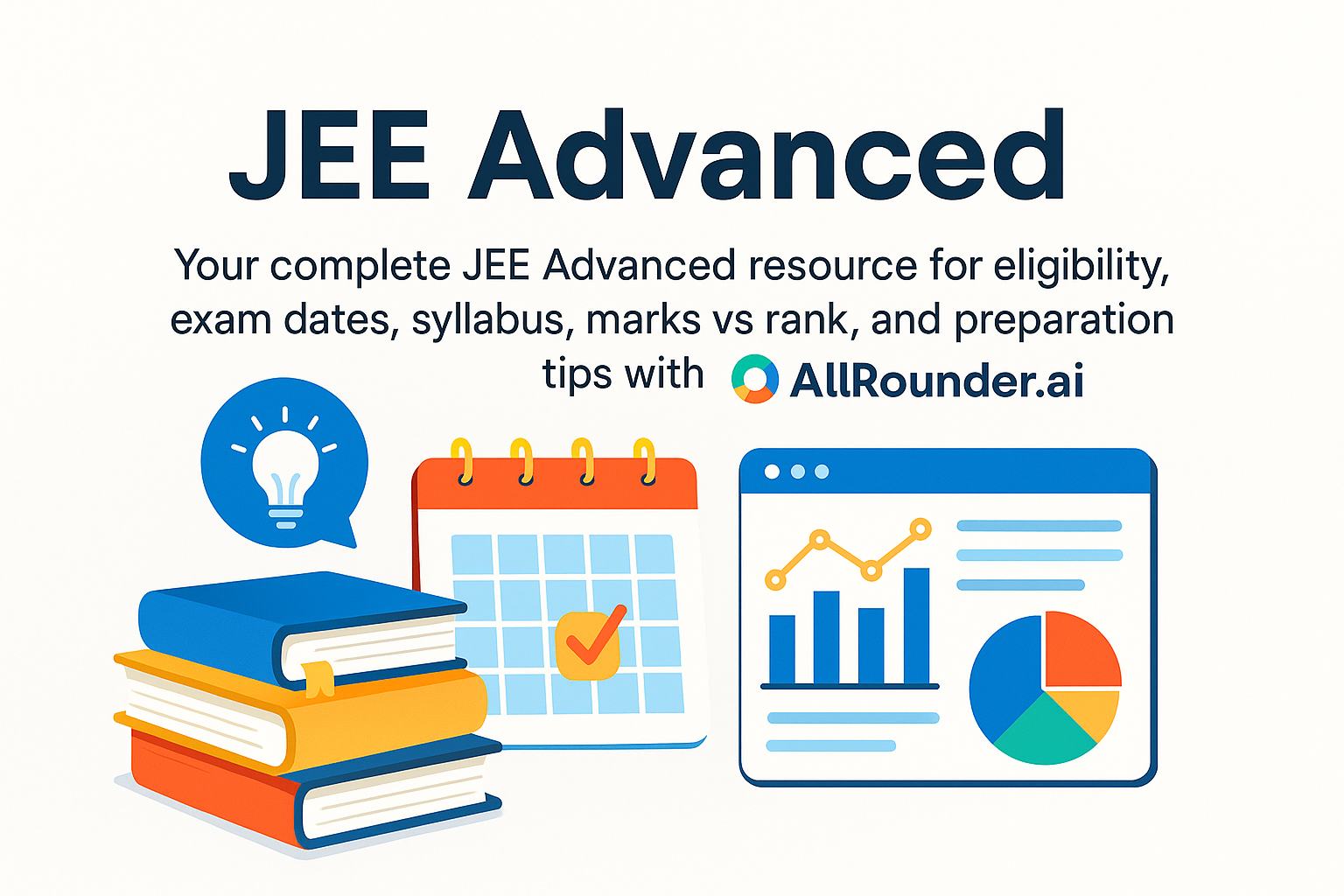
Your complete JEE Advanced resource for eligibility, exam dates, syllabus, marks vs rank, and...
-
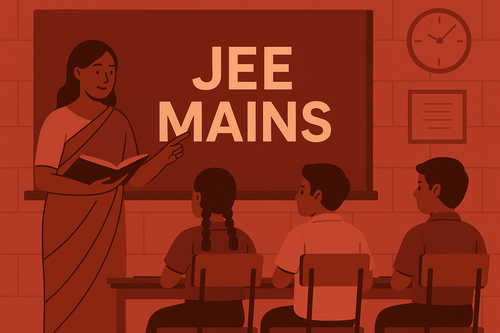
Understand the entire JEE Main process, from application and eligibility rules to the exam...
-

Explore the IB Board – a global curriculum emphasizing holistic, student-centered learning...
-

Learn about CBSE – India’s national school board offering a standardized curriculum, NCERT...
-

Explore everything about the ICSE board – its curriculum, subjects, exam format, and academic...
